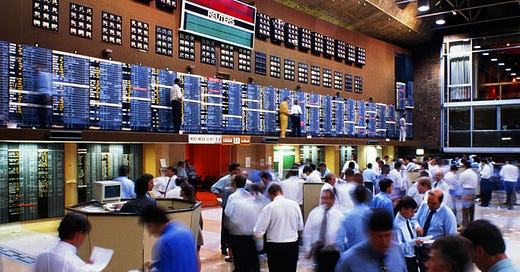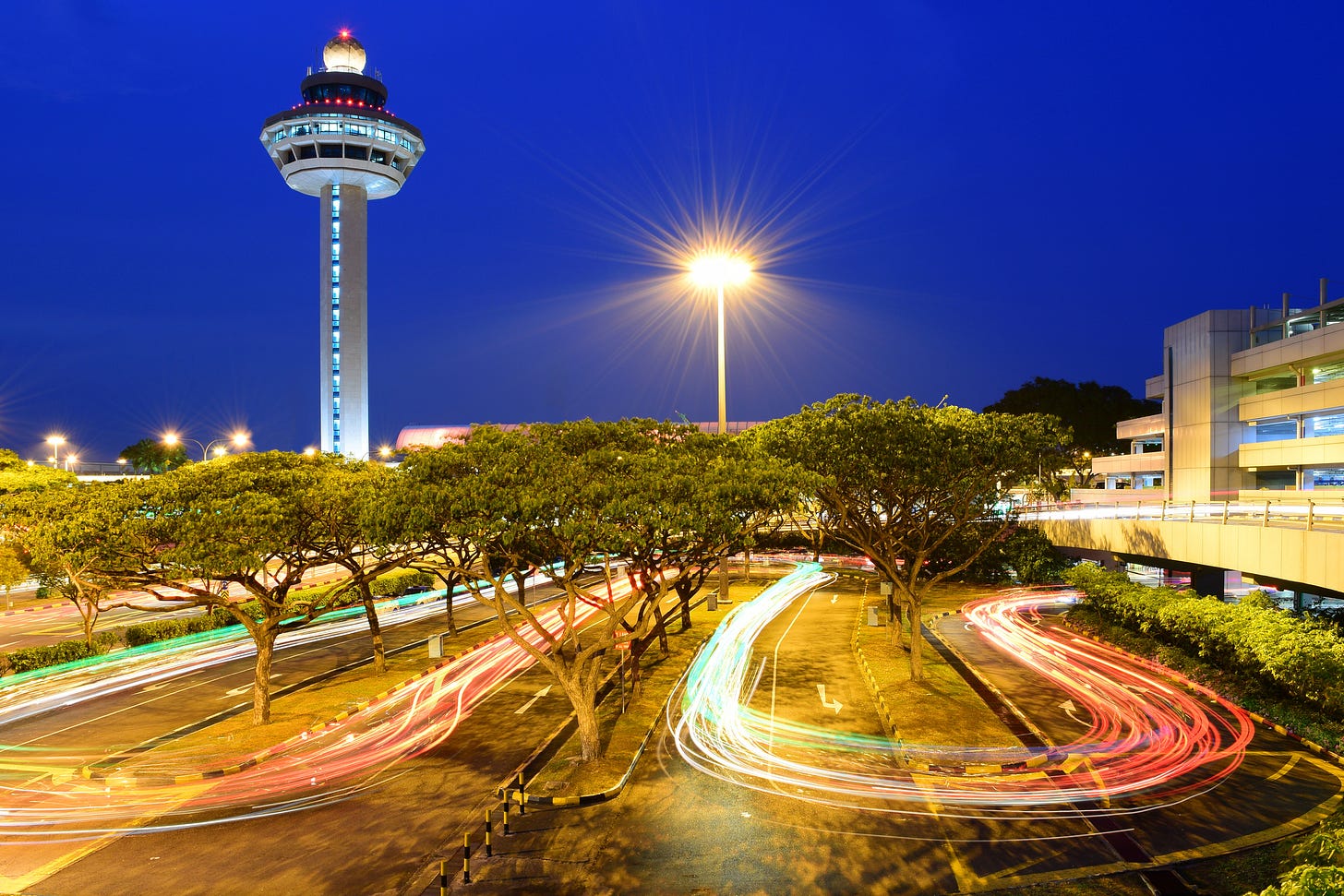Emerging Markets Daily - July 2
JP Morgan Sees More Growth in Robust S. Africa Stocks, Vietnam Stocks Sizzle, Didi Global: By The Numbers, China and India Mass Border Troops, Saudi Approves Acwa IPO, and more
The Top 5 Emerging Markets Stories from Global Media - July 2
South African Stocks Continue Rise, JP Morgan Sees More Growth
Bloomberg
“South African stocks have just closed out their strongest first half in 14 years, and JPMorgan Chase & Co. is among those forecasting further gains for 2021.”
“The benchmark FTSE/JSE Africa All Share Index climbed 12% in the first six months of the year, the best performance since 2007. That outpaced developing country peers, with MSCI Inc.’s gauge of emerging markets up less than 7%. Johannesburg stocks continue to trade at a discount to the MSCI gauge.”
“JPMorgan is overweight South African domestic stocks, including banks and general industrial companies, which stand to benefit in a recovery from the pandemic, adding to the tailwinds provided by rallying commodities prices that have boosted stock prices and the local currency.”
“‘The outperformance for South African relative to emerging-market focused stocks is not over yet,’ John Storey, the U.S. bank’s head of South African equity research, said in an emailed response to questions. ‘The investment sentiment and mood in South Africa is improving, underpinned by a stronger rand, committed foreign direct investment, strategic inbound M&A and an overall improvement in consumer and business confidence.’”
“Domestic South African stocks have been boosted by a rebound in economic activity as well as the quickening pace of reforms in the country, said Peter Brooke, a portfolio manager at Old Mutual Investment Group, which oversees more than $45 billion.” Adelaide Changole reports.
Vietnam Index Continues to Sizzle, Up 28% On the Year
VN Express Business News
“Vietnam’s benchmark VN-Index started off July with a 0.61 percent rise to a new peak of 1,417.08 points, with trading value hitting a three-week high.”
“The index dipped to around 1,402 points in the morning, but quickly shot up, and remained in the green throughout the rest of the day before closing on a near 9-point gain.”
“VN-Index has closed in the green in seven out of the last 10 sessions. It has gained 28 percent this year, second highest behind the Abu Dhabi General Index, according to market data provider StockQ.”
“Trading value on the Ho Chi Minh Stock Exchange (HoSE), on which the index is based, surged 24 percent to VND26.12 trillion ($1.13 billion), highest since June 9. The bourse saw 224 tickers gain and 165 lose.”
“The VN30 basket, comprising the 30 largest capped stocks, saw 22 tickers ending in the green, led by SSI of leading brokerage SSI Securities Corporation with a 4.5 percent gain.” Dat Nguyen reports.
DIDI Global - By the Numbers
Emerging World
Chinese ride-hailing giant Didi Chuxing - known as Didi Global Inc (DIDI) - made its US stock market debut this week, listing on the New York Stock Exchange. The company listed its shares conservatively at $14, and raised $4.4 billion in its IPO. By close of business on July 1, the stock was up roughly 16%.
The DIDI offering was big news on two fronts: it was the largest Chinese company to list on a US exchange since Alibaba’s blockbuster IPO in 2014 (BABA), and it listed at a time of heightened US-China tensions and a cascading tide of legislation aimed at making it more difficult for Chinese companies to list in US equity markets.
Goldman Sachs, JP Morgan, and Morgan Stanley served as lead underwriters of the IPO.
A few key numbers associated with the IPO below:
70% - The percentage of China’s population expected to live in cities by 2030 (a key fact that DIDI laid out in its virtual road show with investors)
$1.25 Billion - The amount that Morgan Stanley Investment Holdings and Temasek Holdings Ltd of Singapore pledged to buy ahead of the IPO.
$16 Billion+ - The value of Softbank’s Vision Fund shares of DIDI after the IPO. SoftBank was one of DIDI’s largest early investors. Others include China’s Tencent as well as Uber.
$78 B - DIDI Market Cap as of Thursday July 1.
$95 B - Uber Market Cap as of Thursday July 1. Notably, Uber will likely cash in on the DIDI IPO
$20 B - Lyft Market Cap as of Thursday July 1
15% - The amount of Didi Chuxing owned by Uber
$8 Billion+ - The value of Uber’s stake in DIDI at the time of IPO.
Sources: Wall Street Journal, Financial Times, Goldman Sachs, Uber, Yahoo Finance.
Geopolitics: China, India Move Tens of Thousands of Troops to Border
Wall Street Journal
“China and India have sent tens of thousands of soldiers and advanced military equipment to their disputed border, as troop deployments in the region reach the highest level in decades.”
“The People’s Liberation Army has gradually increased its troop presence, mostly over the past few months, to at least 50,000, up from about 15,000 at this time last year, according to Indian intelligence and military officials. Those moves have been matched by India, which has sent tens of thousands of its own troops and advanced artillery to the region, the officials said.”
“Both countries have built up infrastructure at the border in recent months, including insulated cabins and huts to keep troops stationed there through the frigid Himalayan winters.”
“Much of the military buildup has occurred in eastern Ladakh, a region that overlaps with Kashmir and Tibet. The deadliest confrontation between the two countries in decades occurred there last June in the Galwan Valley, where 20 Indian and four Chinese soldiers were killed.”
“Chinese security forces, which usually go to the Tibet Autonomous Region for annual summer training under the PLA’s western theater command, recently participated in high-altitude drills focused on combat with sophisticated weapons. Indian officials said they fear that China is using the drills this year as cover to move more troops to the region permanently.”
“China has moved advanced surface-to-air missiles to the region, the officials said, including its HQ-9 system, which is similar to Russia’s S-300 and America’s Patriot antimissile batteries.”
“The country’s army has built hundreds of new structures to support troops at military encampments at the towns of Rudok, in Tibet’s Ladakh frontier, and Kangxiwar, which is north of a plateau controlled by China, known as Aksai Chin, that connects Tibet with the Xinjiang region.”
“China has dug underground bunkers and tunnels and built small hydroelectric power stations and solar panels, the officials said. They have installed portable cabins and huts for troops, helipads and field hospitals.” Rajesh Roy reports.
Saudi Arabia Capital Markets Authority Approves Acwa Power IPO
The National
“Saudi Arabia's Capital Markets Authority (CMA) approved on Wednesday a request for an initial public offering from International Company for Water and Power Projects, also known as Acwa Power.”
“Acwa plans to sell 81.1 million shares, representing 11.1 per cent of its share capital, through the listing. The approval is valid for six months from June 29 and will be cancelled if the offering and listing of the shares are not completed within this period, the regulator said.”
“Acwa operates in 13 countries across the Middle East, Africa and South-East Asia. It has a portfolio of 64 assets with a total investment of $66 billion, producing 42 gigawatts of power and 6.4 million cubic metres per day of desalinated water.”
“The kingdom’s sovereign wealth fund, the Public Investment Fund, is the biggest shareholder in the company with a 50 per cent stake. Acwa has eight other stakeholders, including the Saudi Public Pension Agency and the World Bank's International Finance Corporation.” Fareed Rahman reports.
What We’re Also Reading…
On 40th Birthday, Singapore’s Changi Airport To Enter “New Phase,” Transport Minister Says
Channel News Asia
“Minister for Transport S Iswaran said he is confident that Singapore will ‘grow Changi back once again and bring it into a new phase of life’, as Changi Airport marked its 40th anniversary on Thursday (Jul 1).”
“The Singapore Changi Airport handled 4.3 million passengers in the first six months of its opening in 1981, said Mr Iswaran in a Facebook post. Since then, it has welcomed multiple awards and accolades, including Skytrax's World's Best Airport and Best Airport by Size and Region at the Airport Council International Airport Service Quality Awards. Changi Airport brought home the former 11 times, including in 2020.”
“Mr Iswaran noted how the birth of the airport had been a ‘major feat - not just of engineering, but of vision’. It was built ‘swiftly’ in six years, he said, and crossed the 10-million mark in 1986 before reaching nearly 70 million passengers in 2019.”
"‘Today, we stand in the thick of Changi Airport's biggest crisis ever. COVID-19 has decimated global aviation and set us back decades. But on this day, let us reflect on Changi's history, and take heart. The Changi Spirit is resolute,’ said Mr Iswaran.”Channel News Asia reports.






